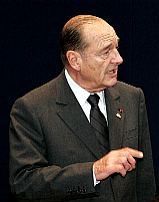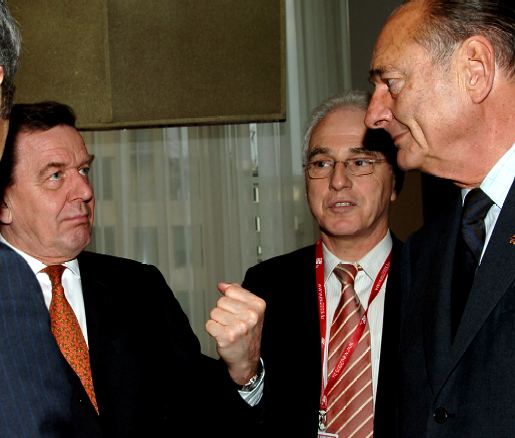Chirac: "unlimited free markets as bad as communism"

And the current president of the European Union, Luxembourg prime minister Jean-Claude Juncker, said: "It's the first time that, in an almost solemn manner, the viewpoint of those who say stop to unlimited liberal free market principles has prevailed. In this view, it was a good day for Europe".

German and French leaders Gerhard Schroeder and Jacques Chirac, trying to display strength
Photo: Council of the European Communities
Photo: Council of the European Communities
American readers may be surprised that "liberalism" and "ultra-liberalism" are used to describe the ideology of free markets. That's the way it is in continental Europa. The term "liberal" is used in the sense of "classic liberalism", the doctrine of free markets and minimal state intervention in the economy. In the US, "liberal" is used in the sense of "leftist", i.e. proponents of government intervention in social and economic affairs. So, when I am a member of the "liberal" party VLD, it is because I am a proponent of free markets, and classic liberalism is the only ideological movement in our political spectrum that defends free market to the fullest, although they are in favor of "social corrections" to capitalism. The term "conservative" is not used in continental Europe for free-market proponents. Most liberal (i.e. pro free market) parties in continental Europe are "progressive" on ethical issues like abortion and euthanasia, simply because they are also proponents of the right to self-determination of the individual. It is only in the UK and the US that free market proponents like the Republicans and the Tories are conservative on ethical issues.



Reacties
ivan
dinsdag, 29 maart, 2005 - 10:04The Bolkestein-directive has nothing to do with unlimited free markets.
De Wit Willy
maandag, 28 maart, 2005 - 21:09wdw
It was not a good day for Europe, it was a bad day and I can't find the word "wisdom" in the vocabulary of Chirac.
Joe
maandag, 28 maart, 2005 - 15:13Chirac finally got wisdom.